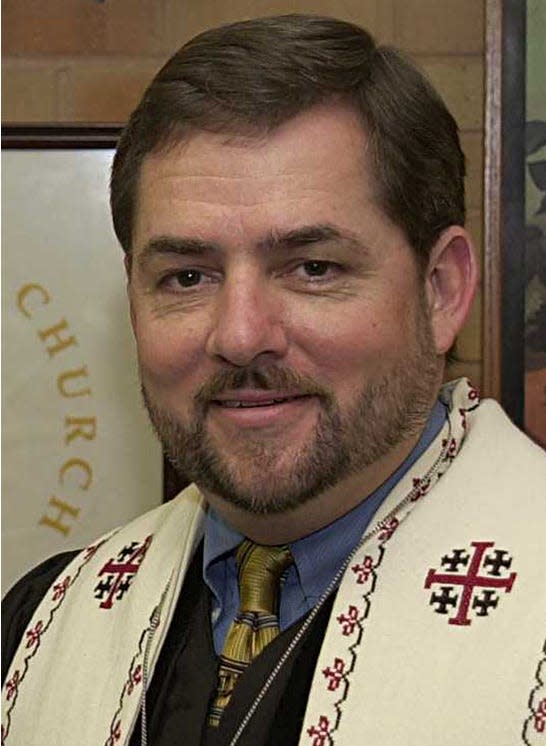Moments with the minister: Blessings and woes
Someone sneezes. “God bless you,” we say. We compliment someone on something new they have acquired. “I’ve really been blessed,” they say. Our latest winter blast had many of us inside. “I was really blessed to be able to work from home,” we might’ve said. Blessings are sometimes noted in such casual ways as to have only momentary meaning or to express some modesty about good fortune.
We may hear people express the opposite of a blessing in just as casual a way. “Woe is me. Getting old is not for the faint of heart.” “Woe my weary soul,” someone might say, after spending a Saturday morning weeding a flower garden or cleaning out rain gutters.
Offering an unbidden blessing can be a kindness that is in short supply these days. Acknowledging the tiredness from some of our efforts or the inevitability of aging can be a way of letting go of some of our complaints. But often times blessings or woes like these are at least a few steps removed from the meaning they once carried.
“In the biblical sense,” Fred Buechner has said, “if you give me your blessing, you irreversibly convey into my life not just something of the beneficent power and vitality of who you are, but something also of the life-giving power of God, in whose name the blessing is given. Even after old, half-blind Isaac discovered that he had been hoodwinked into blessing the wrong twin, he could no more take the blessing back and give it to Esau than he could take the words of it out of the air and put them back into his mouth again.”1
A blessing then was a promise, an announcement of the intention of God to do something. Once spoken, it’s almost as though the blessing itself became a kind of incarnation of God’s purpose. That’s no casual word spoken over a backyard barbecue.
“Woe is me,” might be heard as a humorous or ironic expression. But, deep down, a woe is an expression of great sorrow or distress. Nothing to be laughed at unless you are able to recognize some of the dark humor of Job as he faced the loss of his family, his wealth, and his good standing.
When we come to the 6th chapter of the gospel of Luke, and find Jesus’ Sermon on the Plain, the Lucan parallel to Matthew’s Sermon on the Mount, we hear Jesus declare blessings and woes. No gesundheit for a sneeze or woes for a tired back here. Jesus says, “Blessed are you who are poor, who are hungry, who weep now.” “Blessed,” he says. They are words spoken, blessings made in the flesh to weary, beaten-down, mourning souls.
He gives these blessings directly. “Blessed are you,” he says. He’s speaking directly to those broken people who see in his eyes a holy compassion for them, where they were merely invisible to others. A promise is being spoken about God’s intention for them. There is a
stirring, a sense of something coming into being that they have not known before. The kingdom of God is yours, he says. You will be filled, and you will laugh. Those are blessings that send us in a new direction.
Jesus’ Sermon on the Mount, in Matthew, doesn’t give us any woes. In Luke, we hear a corollary of woe to each blessing given. They are strongly stated and surely gave pause to the disciples and the people in the crowd.
Woe to you who are rich; you who are full now; you who are laughing; you when all speak well of you. I can only imagine there are those in the crowd who wanted no eye contact with Jesus when he spoke those words. I write that in present tense. There are folks in the crowd who are rich and full when Jesus offers these words, just as we may find ourselves fitting into some of those categories as we hear those words come to life for us now. These are strong words that begin to give shape to the great reversal that Jesus’ ministry is about. The first will be last, and the last will be first.
At the heart of these woes is not a condemnation, but an urgency for those of us who may be looked upon as blessed, blessed with plenty, blessed with fullness and comfort, blessed with a high enough perch to look down upon others, to connect with them instead. These woes may be intended to make us uncomfortable enough to lose the discomfort of distancing ourselves from people who are poor, disheartened, broken, or mourning. The very intention of heaven itself, may be to bring us together to care for each other – those who have received no blessings, and those who have been blessed beyond measure. When that happens, we may be able to raise our gaze to look into one another’s eyes to see the blessing of Christ’s presence in each other. We may see the blessing of all of us belonging together. That is a vision of the kingdom of God before our very eyes.

Lander Bethel is the minister of Grand Avenue Presbyterian Church in Sherman and First Presbyterian Church in Denison. He earned a doctoral degree in ministry from McCormick Theological Seminary. He and his wife, Genna, live in Sherman. They have three sons. The views and opinions expressed here are the author’s own and do not necessarily reflect those of the Herald Democrat.
This article originally appeared on Herald Democrat: Moments with the minister: Blessings and woes
